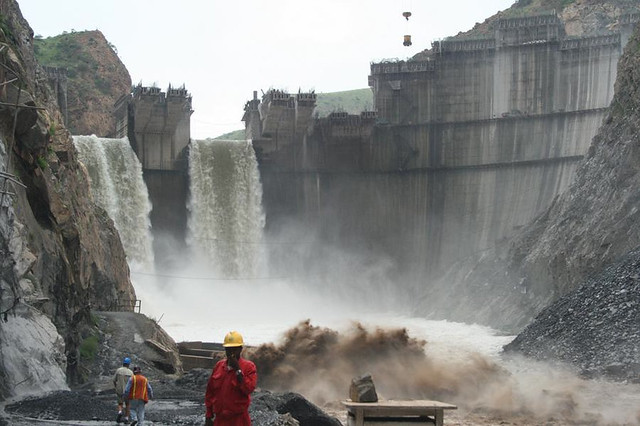Ethiopia outraged over Saudi official’s “hostile” remarks on Nile dam project
By Tesfa-Alem Tekle
March 1, 2012 (ADDIS ABABA) – The Ethiopian government expressed outrage over remarks made by Saudi Arabia’s deputy defense minister, who accused the Horn of Africa nation of posing a national security threat to Sudan and Egypt.

Ethiopia’s Tekeze Dam (Source: International Waters)
During the third session of the Arab Water Council held in Cairo, Saudi Arabias deputy defense minister, Khalid Bin Sultan, said Ethiopia’s power plant project, which is under construction on the Blue Nile River near the Sudanese border is intended “for political plotting rather than for economic gain and constitutes a threat to Egyptian and Sudanese national security.”
Bin Sultan said Ethiopia has ulterior motives for the dam and he further cautions it will particularly be a threat to Egypt’s future, as 95% of country’s population depends on the Nile River.
After Sudan Tribune published the report on Wednesday; Ethiopia’s ministry of foreign affairs gave immediate attention to the issue and top officials of the ministry have thoroughly and seriously discussed on the matter.
Ethiopia’s senior government officials further held high-level meetings with Saudi Arabia’s Ambassador to Ethiopia and other Saudi diplomats in Addis Ababa seeking answers to why the minister made such provocative remarks.
In a brief interview with the state television, Ethiopia foreign affairs spokesperson Ambassador, Dina Mufti, last night said that the remarks were not only an interference on country’s internal affairs but also could negatively affect the existing relations between Arabs and Nile basin African countries.
After holding an urgent meeting with Ethiopian officials, Saudi Arabia’s ambassador to Ethiopia stressed that the remarks made by the defense minister doesn’t reflect the current Saudi stance towards Ethiopia and was just the minister’s personal opinion.
The Saudi Ambassador further said that he will be addressing the issue to King Abdullah of Saudi Arabia.
Mufti said Ethiopia will publicise details when it receives official clarifications from the Saudi Arabian government.
Ethiopian officials said it was quite strange for a Saudi Arabian minister to make such serious and sensitive allegations against Ethiopia, which has cordial diplomatic relations with the Arab kingdom.
Sudan Tribune has learnt that Ethiopian Prime Minister, Hailemariam Desalegn, on Thursday, has raised the issue while holding talks with visiting Finance Minister of Saudi Arabia, Ibrahim Abdulaziz Al-Assaf.
After Ethiopia launched the massive $4.8 billion dam at Nile River in 2011, two downstream countries, Sudan and Egypt, have argued the construction of the Dam – the biggest in Africa – would reduce the flow of the water to their territories.
Although Ethiopia is a source of 85% of the Nile’s water, Egypt and Sudan benefit over 90% of the total water resources under colonial era agreement.
The East African nation launched the construction of the mega dam after Ethiopia, Uganda, Rwanda, Tanzania, Kenya and Burundi signed the Entebbe agreement In April 2010, to reverse a colonial-era treaty seeking equitable water utilisation.
Egypt has been warning upper stream countries against construction of any Dams on the Nile River saying it is a life or death issue and any attempts would be considered as threat to national security.
According to whistle blowing site, Wikileaks, Cairo had reached an agreement with Khartoum to build air base in Sudan to strike Ethiopia Dam facility, a claim Cairo and Khartoum denied.
Egypt has also been calling on international donors not to fund Ethiopia’s Dam project, however Addis Ababa later announced that it will continue the project with or without external funds.
As a good will gesture and to build trust among the riparian countries, the late Ethiopian Prime Minister, Meles Zenawi, proposed the establishment of the Tripartite Committee, now renamed as an international panel of experts, which officially launched on 8 May, 2012 to asses the impacts of the project.
The committee which is composed of six experts drawn from Ethiopia, Egypt and Sudan, and another four international experts is set to announce and submit its final findings and recommendations to the three governments in May 2013.
(ST)
ST – In unusual rebuke, Saudi Arabia accuses Ethiopia of posing threats to Sudan & Egypt
